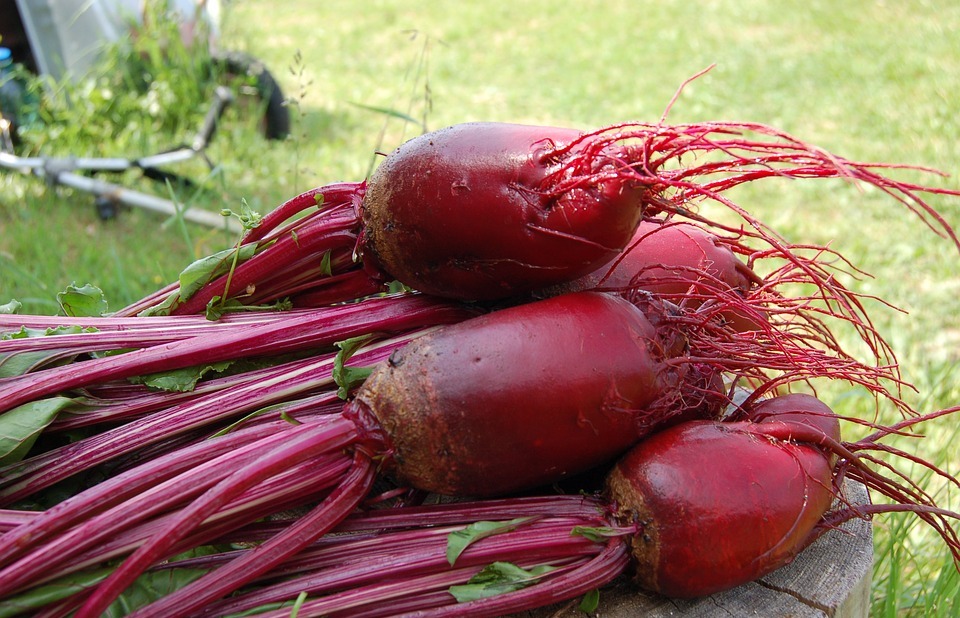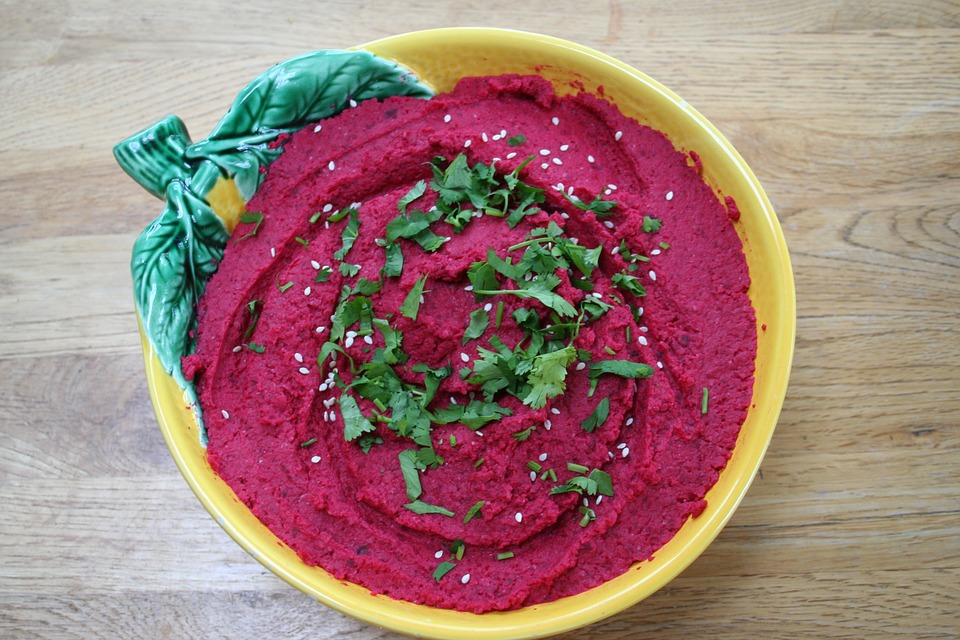As a dog owner, I'm always on the lookout for healthy and delicious treats for my furry friend. I'm sure you are too! One treat that I've often wondered about is beets. They're packed with nutrients, vibrant in colour, and, let's be honest, they look pretty darn appealing. But the question remains: are beets safe for our canine companions? I mean, we've all seen those hilarious videos of dogs getting their noses stained purple from eating beets, but is it something to worry about?
Well, I've done some digging, and I'm ready to share my findings. We'll delve into the world of beets and dogs, exploring their nutritional benefits, potential risks, and how to incorporate them into your dog's diet safely.
(Part 1) Beet Basics: A Colorful Delight

Beets, those vibrant root vegetables, are a powerhouse of nutrients. They're bursting with vitamins, minerals, and antioxidants. I've always been a fan of their earthy sweetness, and it turns out, dogs can appreciate that too! They're rich in:
- Vitamin C: Essential for immune function, wound healing, and collagen production. Think of it as the superhero of your dog's immune system, helping them fight off those pesky viruses and infections.
- Folate: Crucial for cell growth and development, especially during pregnancy. For expectant moms, folate plays a vital role in ensuring healthy pups.
- Potassium: Helps regulate blood pressure and muscle function. It's like a natural electrolyte boost, keeping those paws and tail wagging strong.
- Fiber: Promotes digestive health and regularity. A healthy gut is a happy gut, and fiber keeps everything running smoothly.
- Nitrates: These naturally occurring compounds have been linked to improved cardiovascular health. Think of it as a little heart-healthy boost for your furry friend.
(Part 2) The Beet Benefits: A Healthy Treat

So, with all those nutrients packed into a single root, it's no surprise that beets offer a range of benefits for dogs. Here's a breakdown of how they can contribute to your dog's wellbeing:
Boosting the Immune System
The high vitamin C content in beets helps support your dog's immune system, making them less susceptible to illnesses. Imagine your dog as a tiny warrior, and vitamin C is their shield, protecting them from those pesky viruses and bacteria.
Promoting Healthy Digestion
The fiber in beets aids in regulating digestion, preventing constipation and promoting healthy bowel movements. Think of it as a little sweep for their digestive system, keeping everything clean and tidy. This is especially beneficial for dogs prone to digestive issues.
Improving Cardiovascular Health
Studies suggest that the nitrates in beets can contribute to improved cardiovascular health. These nitrates convert into nitric oxide, which helps relax blood vessels, improving blood flow and lowering blood pressure. It's like a natural boost for their heart, keeping it strong and healthy.
(Part 3) The Potential Risks: A Word of Caution

While beets offer numerous benefits, there are some potential risks to be aware of. It's important to remember that moderation is key.
Digestive Upset
Beets are high in fiber, which can sometimes cause digestive upset in dogs, especially if they're not used to eating them. You might see symptoms like gas, bloating, or diarrhoea. Introducing beets gradually and starting with small amounts can help prevent these issues. Imagine your dog's digestive system as a delicate ecosystem; introducing new foods gradually helps it adjust and avoid any uncomfortable surprises.
Sugar Content
While beets are considered a healthy treat, they do contain some sugar. This isn't a major concern for most dogs, but for those with diabetes or weight management issues, it's wise to be cautious and consult your vet for guidance. Your vet can advise you on how to manage the sugar content and ensure your dog stays healthy and happy.
Oxalates
Beets contain oxalates, which can bind to calcium and potentially form kidney stones in some cases. While this is uncommon, it's something to be aware of, particularly for dogs with a history of kidney problems. Just like with any new food, it's always a good idea to check with your vet if your dog has any pre-existing conditions.
(Part 4) Feeding Beets Safely: Tips and Tricks
The key to offering beets safely is to follow these guidelines:
1. Start Small
Introduce beets gradually, starting with small amounts and monitoring your dog's reaction. If they show any signs of digestive upset, stop feeding them beets and consult your vet. Think of it as a slow and steady approach, just like you would when introducing any new food to your dog.
2. Choose the Right Form
Beets can be offered in various forms: cooked, raw, roasted, or in dehydrated treats. Cooked or roasted beets are easier to digest, while raw beets might be harder for some dogs to process. Personally, I find that my dog enjoys roasted beets the most. It's a great way to add a bit of sweetness and crunch to his meals. Experiment and see what form your dog enjoys best!
3. Avoid Sugar and Salt
When preparing beets, avoid adding sugar or salt. These additions can be harmful to dogs and negate the health benefits of beets. Plain, unseasoned beets are the best option. Remember, less is more when it comes to added ingredients.
4. Don't Overdo It
Beets should be offered as a treat in moderation. They shouldn't replace your dog's regular meals. A few small bites a week are enough to provide them with the benefits of these colorful vegetables. It's all about balance and ensuring that your dog's diet is complete and nutritious.
(Part 5) My Personal Experiences: A Beet-Loving Dog
I've personally introduced beets to my dog, a lively Labrador Retriever named Bailey, and he absolutely loves them! I've found that he enjoys them roasted and diced into his kibble. It adds a burst of flavour and colour to his meals. He also enjoys the occasional beet treat, like a dehydrated beet chip. I always make sure to give him small amounts and monitor his reaction, but so far, he hasn't had any digestive issues.
I'm careful to avoid sugar and salt when preparing his beet treats, and I've noticed a slight improvement in his energy levels since incorporating them into his diet. Of course, this could be due to other factors, but I like to think it's the beet power working its magic! It's a fun and healthy way to add some variety to his diet.
(Part 6) Beet Recipes: Adding a Touch of Colour to Your Dog's Meals
Here are a few easy and healthy beet recipes that you can try for your dog:
Roasted Beet Treats
Ingredients:
- 1 beet, peeled and chopped
- 1 tablespoon olive oil
Instructions:
- Preheat your oven to 350°F (175°C).
- Toss the chopped beet with olive oil.
- Spread the beet pieces on a baking sheet and roast for 30-40 minutes, or until tender.
- Let the beets cool completely before offering to your dog.
You can also use the roasted beets to add some color and flavor to your dog's kibble or home-cooked meals. It's a great way to make their meals more appealing and provide them with some added nutrients.
Dehydrated Beet Chips
Ingredients:
- 1 beet, thinly sliced
Instructions:
- Preheat your oven to 200°F (95°C).
- Spread the beet slices on a baking sheet lined with parchment paper.
- Dehydrate for 4-6 hours, or until crisp.
- Let the chips cool completely before offering to your dog.
These chips are a healthy and tasty alternative to commercially available dog treats. They're a great way to satisfy your dog's chewing needs and provide them with a healthy snack.
Beet and Banana Smoothie
Ingredients:
- 1/2 cup cooked beets, pureed
- 1/2 cup banana, sliced
- 1/2 cup water or low-fat yogurt
Instructions:
- Combine all ingredients in a blender and blend until smooth.
- Serve immediately or store in the refrigerator for up to 2 days.
This smoothie is a great source of vitamins, minerals, and antioxidants. It's also a good way to hydrate your dog on hot days.
(Part 7) Beet FAQs: Your Burning Questions Answered
So you're ready to give beets a try, but you have a few lingering questions? Don't worry, I've got you covered. Here are some of the most common questions about feeding beets to dogs, answered in detail:
1. Can All Dogs Eat Beets?
Generally, yes. Most dogs can tolerate beets without any issues. However, it's always a good idea to consult your vet, especially if your dog has any underlying health conditions, like diabetes or kidney disease. Your vet can advise you on the appropriate amount and frequency of beet consumption for your dog. They know your dog best and can help you tailor their diet to their specific needs.
2. How Much Beet Should I Give My Dog?
Start with a small amount, like a teaspoonful, and gradually increase it based on your dog's size and tolerance. A good rule of thumb is to keep beet treats to no more than 10% of their daily calorie intake. Always monitor your dog's reaction to ensure they don't experience any digestive upset.
3. What If My Dog Has an Upset Stomach After Eating Beets?
If your dog experiences digestive upset after eating beets, stop feeding them beets and consult your vet. They can help determine if the upset is related to the beets or another issue. In most cases, the digestive issues will resolve within a day or two. However, it's always best to err on the side of caution and seek professional advice.
4. Are Beet Greens Safe for Dogs?
Yes, beet greens are safe for dogs and offer even more nutrients than the beets themselves. They're a good source of vitamins A, C, and K, as well as iron. You can offer beet greens cooked or raw, in moderation. However, be aware that beet greens can be a bit more fibrous than the beets themselves, so you might want to start with small amounts. Don't be surprised if your dog enjoys the greens just as much as the beets!
5. What Are Some Signs My Dog Is Having an Adverse Reaction to Beets?
Some signs of an adverse reaction to beets can include:
- Digestive upset (gas, bloating, diarrhea)
- Vomiting
- Lethargy
- Loss of appetite
- Skin rash or itching
- Red or swollen eyes
- Difficulty breathing
If you notice any of these signs, stop feeding your dog beets and contact your vet immediately. These symptoms could indicate an allergy or intolerance to beets, and prompt veterinary attention is crucial.
(Part 8) Final Thoughts: A Delicious and Healthy Treat
In conclusion, beets can be a healthy and delicious treat for most dogs. They're packed with nutrients and can provide a boost to their immune system, digestive health, and cardiovascular function. However, moderation is key. Introduce beets gradually, starting with small amounts, and avoid adding sugar or salt. Remember to consult your vet for guidance, especially if your dog has any pre-existing health conditions. With these precautions in mind, you can enjoy the benefits of these vibrant root vegetables with your furry friend!
So, if you're looking for a colorful and nutritious treat for your dog, give beets a try. Your dog might just love them as much as I do!
Everyone is watching
-

Can Dogs Eat Bananas? A Guide to Safe Treats
DOGS & PUPPIESThis comprehensive guide will delve into the world of canine nutrition, focusing on the popular question: can ...
-

Can Dogs Eat Oranges? (Is It Safe or Toxic?)
DOGS & PUPPIESThis article delves into the question of whether dogs can safely consume oranges. We'll explore the nutrition...
-

Can Dogs Eat Grapes? The Shocking Truth About This Fruit
DOGS & PUPPIESThis article delves into the controversial topic of grapes and dogs, exploring the potential dangers associate...
-

Why Do Dogs Eat Poop? Understanding Coprophagia in Dogs
DOGS & PUPPIESThis article delves into the perplexing phenomenon of coprophagia, the act of eating faeces, in dogs. We explo...
-

Can Dogs Eat Shrimp? A Guide to Safety and Risks
DOGS & PUPPIESThis comprehensive guide dives into the world of shrimp and dogs, exploring the potential benefits and risks a...
